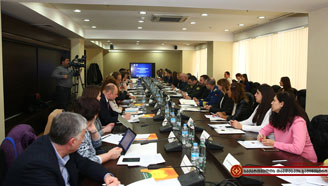Improving gender equality in Georgia’s armed forces
- English
- Ukrainian
As the armed forces of various countries open up more positions to women, striving for gender equality and reducing barriers for the meaningful participation of women in the military is increasingly important. The Science for Peace and Security (SPS) Programme supports a project to improve the conditions of women in Georgia’s armed forces.

“We believe that a diverse force is a better force and to support this diversity and to retain force effectiveness, we need to build a barrier-free environment,’‘ said levan Izoria, Georgian Minister of Defence, at the opening of an experts’ workshop sponsored by the SPS Programme, held in Tbilisi from 21 to 23 February 2018. “We are building armed forces free from any type of harassment, abuse or violence, where every serviceman and woman feels supported, encouraged and considered.”

During this workshop, international experts set the scene for an assessment of the current experiences of men and women in the Georgian Armed Forces. They considered how international good practice in gender-responsive climate assessments in armed forces might be applied.
The workshop also identified appropriate methods for conducting the assessment, such as surveys and focus groups, and to plan the next steps of this SPS initiative.
Assessing the experience of personnel
In November 2017, NATO and Georgia launched this two-year project to develop and execute a so-called organisational climate assessment concerning gender equality, harassment and abuse in the armed forces of Georgia.
The climate assessment is designed to provide those in command with an independent evaluation of the experience of personnel in their unit and the opportunity to address issues which may arise during their leadership. The project will also provide training to Georgian defence ministry personnel to design and execute climate surveys and assessments, and analyse the data collected.
While gender equality is a focus, the project aims to improve the conditions for both men and women in the armed forces. “Ensuring good working conditions for both men and women in the military is key for having effective armed forces,” said Dr Jamie Shea, NATO Deputy Assistant Secretary General for Emerging Security Challenges.
Building high standards of professional accountability
This SPS initiative falls in a period of a major transformation process of the Georgian defence system, aimed at enhancing capabilities and resilience and increasing interoperability with NATO.
“We are determined to build a NATO standard, reliable, effective, affordable and sustainable force structure, manned with professional, quality personnel ensured with the necessary conditions and healthy environment to be able to efficiently perform their military duties,” emphasised Defence Minister Izoria
“Focusing on achieving gender equality helps armed forces to improve their responsiveness to communities they operate amongst, as well as get the best from their personnel and meet the highest standards of professional accountability,” explained Megan Bastick, Gender and Security Fellow at the Geneva Centre for the Democratic Control of Armed Forces (DCAF), an intergovernmental foundation and think-tank. “Understanding the experiences of men and women in the armed forces is a necessary first step towards gender equality goals.”
The SPS project enjoys high-level political support from both the Georgian Ministry of Defence and the Prime Minister’s Special Representative for Gender Equality, Sopo Japaridze, and receives strong practical support from Spain and the United Kingdom.
The Slovenian and Swiss chapters of DCAF contribute to this project by sharing expertise and offering training.
Other current projects with Georgia
This project is one of the most recent SPS initiatives with Georgia, an active partner under the NATO SPS Programme. Georgian scientists and experts are also involved in a project that develops innovative technology to help contain underground blasts and in a regional initiative to reduce the risk of geohazards to the Enguri hydro-electrical facility, an important element of Georgia’s energy infrastructure.
